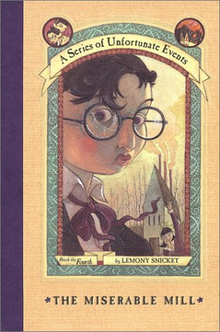The Miserable Mill of Snicket's A Series of Unfortunate Events
Review by: Leo Maurer
 These past few weeks, I’ve been continuing my way through A Series of Unfortunate Events. As of last blog post, I had completed the third book in the series, The Wide Window. Since October 11, I have now completed The Miserable Mill and I am working my way through the Austere Academy at the moment. For this post, I will be offering a critique upon the book The Miserable Mill.
These past few weeks, I’ve been continuing my way through A Series of Unfortunate Events. As of last blog post, I had completed the third book in the series, The Wide Window. Since October 11, I have now completed The Miserable Mill and I am working my way through the Austere Academy at the moment. For this post, I will be offering a critique upon the book The Miserable Mill.
This book is the fourth book in the series, and marks the fourth guardian the Baudelaire children have belonged to in the series. After their miserable experience with Lachrymose Lake and their Aunt Josephine, Mr. Poe (the man who is managing their affairs, and doing quite a bad job), whisks them away to Lucky Smells Lumbermill located in Paltryville, a small town with almost nothing in it. The children arrive and immediately notice the building shaped like an eye, the mark of Count Olaf and they know this place will be no better than any of their previous residences. Upon their arrival, the children are directed to begin work in the lumber mill the next morning. The story then follows the children through terrible accidents, mind control, a particularly high pitched voice, and a man who is constantly enveloped in cigar smoke.
This book marks a turning point for how Sunny, Klaus and Violet begin to view their situation. At first when their parents died, they were optimistic outlook on their situation. The children looked to find the best moments in their plights, but this book marks a turning point when the children accept bad things are going to happen to them and even being to condemn the view of Phil, the resident optimist. Snicket offers us an insight into Violet’s mind when Klaus is not near the two sisters, and explains to us she feels dread and like everything will not be alright, when in previous books she almost always managed to look on the bright side.
The kids are also starting to become more perceptive and cooperative, but at the same time more independent of each other. For example, in this book there is a heavy emphasis on the kids noticing things that cater to their talents, i.e. Violet looking at the machines in the lumber mill and deciphering how they work and Klaus taking a particular interest in the library. The main part of the children's plight begins interestingly, when Klaus and Violet's roles flip in a way. Klaus is forced by the foreman of the mill, to operate a machine that cuts wood logs into planks, without almost any instruction. From previous books, readers know Violet is the crafty child in the family and Klaus is not made for this work. The operations go terribly wrong and that leads the plot into the next switch of roles. The sisters have to use Klaus's talent of reading to find out what happened to their brother and figure out how to fix it after his glasses broke and he had to visit the ophthalmologist. Here, the reader sees Violet stepping up to keep her siblings safe, even if it means doing something she finds particularly difficult.
This book is an interesting read, but is more useful if the reader has made their way the through the previous stories in the series. I have enjoyed watching the Baudelaire children develop into strong main characters who can find a way out of even the most dire situations. As I've mentioned in the previous blog post, this is my second time reading the series and I've caught a lot more details this time around. I look forward to continuing my way through the series, and I recommend this series to anyone who wants a fast story with a lot of depth. In accordance with my last post, the whole series get a 9.5/10 and this book gets a 9.8/10 for being somewhat slow, but overall a great read.
It was interesting how you compared this single book to the whole series. It gave me a better look at the series and what the storyline was about. I think it was a smart choice to mention most of the key points in the story, since it gives the reader an in depth review of what's happening overall. I've read the first book of this series and this review gives me some encouragement to finish the series. Really nice job on the review!
ReplyDeleteI like how you quickly inform the reader of your blog about all the books leading up to the Miserable Mill to give them some background information before they go on to read about the book itself. I also thought the way you organized your review by having a paragraph for each topic you discussed such as your opinions, some background information, and the book itself. However, I doubt I'll ever read this book as I've read the first book and I found it to be a very boring and predictable book. But even though I disagree with the 9.5/ 10 you gave the series, you still have a well written review that I enjoyed reading.
ReplyDelete